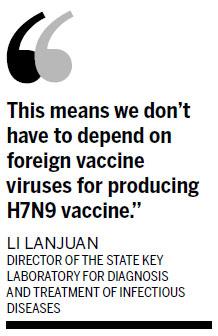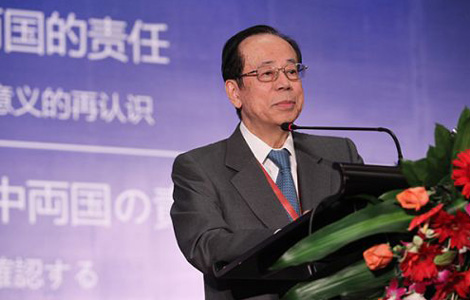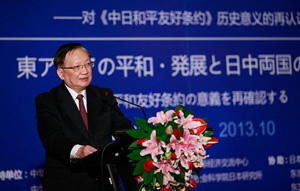Vaccine virus for H7N9 developed
Updated: 2013-10-28 07:01
By Xinhua and China Daily (China Daily USA)
|
||||||||
Experts said the successful development of a vaccine virus for the H7N9 bird flu virus means China can use it to produce its own H7N9 vaccine.
"This means we don't have to depend on foreign vaccine viruses for producing H7N9 vaccine," said Li Lanjuan, director of the State Key Laboratory for Diagnosis and Treatment of Infectious Diseases. "Before this, China had not developed a flu vaccine virus, and needed vaccine viruses from abroad to produce vaccines for all kinds of flu, including H1N1 flu.
"It's much slower if we take them from abroad to make vaccines," said Li, a leading researcher from the Chinese Academy of Engineering,
Chinese researchers announced on Saturday they had developed a vaccine virus for the H7N9 bird flu virus after the flu strain had infected more than 130 people, with 45 fatalities reported.
Yang Shigui, who was involved in the development of the vaccine virus and is a researcher in the lab, said the development means China can share its own vaccine strain with other countries through the World Health Organization.

Shu Yuelong, director of the Chinese National Influenza Center, said this is the first influenza vaccine virus ever developed by Chinese scientists.
The vaccine virus has provided important technical support in the fight against the new flu strain, making contributions to H7N9 flu virus epidemic control all over the world, said Shu, also director of the World Health Organization's Collaborating Center for Reference and Research on Influenza.
The vaccine virus was jointly developed by the First Affiliated Hospital under the School of Medicine of the Zhejiang University, Hong Kong University, Chinese Center for Disease Control and Prevention, National Institute for Food and Drug Control and the Chinese Academy of Medical Sciences.
Li Lanjuan, a researcher from the Chinese Academy of Engineering, said the team started research after isolating the H7N9 bird flu virus from the throat swab sample of an infected patient on April 3.
The team applied plasmid reverse genetics and genetic reassortment, which was widely adopted by the world, to develop the vaccine seeds, which later proved to be safe with the embryonated chicken eggs, she said.
The vaccine virus has passed tests on ferrets conducted by the Institute of Laboratory Animal Sciences of the Chinese Academy of Medical Sciences. Drug authorities have also verified the virus in accordance with relevant requirements of Chinese Pharmacopoeia.
At a news conference on the research findings held on Saturday in Hangzhou, Zhejiang province, medicine producers, such as Tianyuan Bio-Pharmaceutical Co Ltd, showed interest in the vaccine's production.
Shu, however, emphasized that factories test the vaccine virus for its safety and effectiveness before producing H7N9 vaccines on a large scale.
China reported the world's first human case for H7N9 bird flu infection in March. By the end of September, 134 people had been confirmed to have been infected with the virus, of whom 45 died, according to the National Health and Family Planning Commission.
(China Daily USA 10/28/2013 page5)

 Serena beats Li Na for WTA title
Serena beats Li Na for WTA title
 Nuclear submarine fleet comes of age
Nuclear submarine fleet comes of age
 5 pharmacies begin to sell baby formula
5 pharmacies begin to sell baby formula
 The suave style of America's dapper dynasty has arrived
The suave style of America's dapper dynasty has arrived Mother and four children stabbed to death in New York
Mother and four children stabbed to death in New York
 China Fashion Week S/S 2014: day 2
China Fashion Week S/S 2014: day 2
 Demonstrators protest against govt surveillance in US
Demonstrators protest against govt surveillance in US
 Where art thou, my love?
Where art thou, my love?
Most Viewed
Editor's Picks

|

|

|

|

|

|
Today's Top News
ABC apologizes for offensive words on Chinese
Three die after car ploughs into crowd
NQ Mobile hits back after US stock plunge
Obama aware of spying on Merkel: German paper
Cousin killed mom, 4 kids
High speed versus history
States gear up for symposium
Film finds a hip-hop-tai chi connection
US Weekly

|

|






